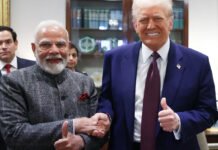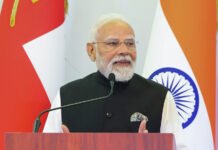INVC NEWS New Delhi / London – The recently concluded India–UK Free Trade Agreement (FTA) marks a major milestone in bilateral trade relations, opening up 99% of the UK market to Indian products under duty-free access. However, even as this historic deal promises a boost to Indian exporters, a new challenge has surfaced—preventing the backdoor entry of Chinese goods through the relaxed trade routes. Both nations are now turning their attention to enhancing domestic content in traded products to safeguard the integrity and intended benefits of the agreement.
India–UK FTA: A Game-Changer for Indian Exporters
The free trade agreement between India and the United Kingdom provides a significant advantage to Indian manufacturers and exporters, especially in sectors such as:
Textiles and Apparel
Engineering Goods
Pharmaceuticals
Information Technology
Handicrafts and Leather Products
The duty-free entry of Indian goods into 99% of the UK’s market not only boosts India’s export potential but also strengthens strategic ties between the two economies. According to trade analysts, this agreement could unlock billions in trade value and create new employment opportunities in both countries.
Report Highlights Hidden Risks: The China Factor
While celebrating the FTA’s benefits, a report from Canara Bank underscores a critical concern—the possibility of Chinese goods infiltrating India-UK trade through indirect routes. The report stresses that without strict rules of origin and robust verification protocols, the agreement could unintentionally create a backdoor for Chinese products, undermining local industries.
“If origin verification is not enforced strictly, there’s a real risk of China exploiting this FTA to access UK and Indian markets,” the report warns.
Such scenarios could dilute the positive impact of the FTA on domestic manufacturers and erode the competitive edge intended for Indian and British businesses.
The Call for Stronger Domestic Content Rules
To combat this risk, both India and the UK are expected to increase the minimum domestic value addition requirement in traded goods. This measure ensures that only products genuinely manufactured within the two countries enjoy the benefits of the FTA.
Key Measures Being Considered:
Stricter Rules of Origin: Ensuring goods labeled as Indian or British are not repackaged imports from China.
Enhanced Customs Checks: More rigorous inspections at ports and customs facilities.
Mandatory Value Addition Thresholds: Defining a specific percentage of local content required to qualify for duty-free status.
Digital Tracking & Certifications: Leveraging blockchain or traceability tools to confirm manufacturing sources.
India’s Strategic Push for Self-Reliance
The FTA comes at a time when India is aggressively promoting its ‘Make in India’ and ‘Atmanirbhar Bharat’ (self-reliant India) initiatives. Ensuring that only truly Indian products benefit from trade deals aligns perfectly with this broader national strategy.
By discouraging the entry of Chinese goods through indirect routes, the government aims to:
Protect Indian MSMEs from unfair competition
Increase value-added exports
Strengthen supply chain transparency
Build long-term trust with trading partners
Why China’s Infiltration Risk is Real
China has long leveraged free trade loopholes in third-party countries to reroute its goods, avoiding tariffs or sanctions. In recent years, similar patterns have been observed in:
Southeast Asian nations acting as transit hubs for Chinese electronics
Apparel and textile products repackaged to gain FTA benefits
Auto parts and industrial machinery being mislabeled to meet local origin criteria
This track record gives weight to the concerns raised in the Canara Bank report.
Opportunities for Indian Industries
If executed effectively, the India-UK FTA can be a massive growth opportunity for Indian sectors that meet strict origin standards. Key winners include:
1. Pharmaceuticals
With the UK being a major consumer of generic drugs, India’s pharmaceutical exports stand to gain from zero-duty access, provided they meet the origin verification norms.
2. Engineering Goods
India can supply machinery, equipment, and industrial components to the UK, as long as these are domestically produced and not assembled from imported Chinese parts.
3. Textiles and Apparel
Indian fashion and textile brands can capture UK market share quickly, but will need to prove their yarns, fabrics, and final stitching meet Indian origin standards.
Strengthening Bilateral Trust through Trade Integrity
Both India and the United Kingdom understand that the long-term success of the FTA hinges on transparency, compliance, and integrity. Ensuring that only eligible goods benefit will not only protect domestic interests but also foster deeper strategic trust between the two nations.
Trade officials are reportedly working on harmonized digital verification tools to monitor shipments and cross-check manufacturer certifications in real-time.
Opportunity with Responsibility
The India–UK Free Trade Agreement is a landmark step towards deepening economic collaboration and boosting Indian exports. However, it also brings with it the responsibility of safeguarding the agreement’s intent by keeping non-participant nations like China from exploiting it.
By focusing on increased domestic content, implementing strict rules of origin, and tightening supply chain checks, both nations can ensure that this historic agreement delivers long-term, sustainable benefits—free from the shadow of external manipulation.
















